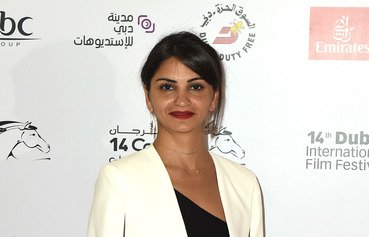RIYADH -- Less than four years after lifting a decades-long ban on cinemas, Saudi Arabia on Monday (December 6) kicked off the first major film festival it is hosting in the port city of Jeddah.
Over the next 10 days, actors and directors will tread the red carpet at Jeddah's Red Sea International Film Festival.
The festival starts a day after Jeddah hosted its first Formula One Grand Prix, also an attempt to portray Saudi Arabia in a different light.
It will showcase 138 long and short films from 67 countries in more than 30 languages.
![A jet releases smoke as it performs an air display over the Jeddah Corniche Circuit ahead of the Formula One Saudi Arabian Grand Prix in Jeddah on December 5. [Giuseppe Cacace/AFP]](/cnmi_am/images/2021/12/06/32969-Jeddah-Grand-prix-600_384.jpg)
A jet releases smoke as it performs an air display over the Jeddah Corniche Circuit ahead of the Formula One Saudi Arabian Grand Prix in Jeddah on December 5. [Giuseppe Cacace/AFP]
![Saudi women attend the 'Short Film Competition 2' festival on October 20, 2017, at King Fahad Culture Centre in Riyadh. [Fayez Nureldine/AFP]](/cnmi_am/images/2021/12/06/32975-saudi-short-film-600_384.jpg)
Saudi women attend the 'Short Film Competition 2' festival on October 20, 2017, at King Fahad Culture Centre in Riyadh. [Fayez Nureldine/AFP]
Among them are Jordan's critically acclaimed "The Alleys", directed by Bassel Ghandour, and non-Arabic films including Joe Wright's "Cyrano" and "83", the story of India's 1983 cricket World Cup victory.
The festival also is expected to honour Haifaa al-Mansour, the first female Saudi director, who shot "Wadjda" in 2012, the winner of a number of international awards.
The rise of Saudi Arabia's de facto ruler, Crown Prince Mohammed bin Salman, in 2017 has ushered in a number of reforms.
"The thought of organising a film festival in Saudi Arabia was unimaginable just five years ago," said Egyptian art critic Mohamed Abdel Rahman.
The festival also has an eye on a burgeoning market for shooting and consuming films in Saudi Arabia.
Saudi Arabia's annual box office could reach $950 million by 2030, according to a report by multinational accountancy firm PwC.
It estimates the kingdom's forecast population of nearly 40 million could absorb up to 2,600 cinema screens.
Social shift
A social shift in the conservative Gulf state has included the lifting of a ban on women driving and allowing mixed-gender concerts and other events.
The kingdom held its first-ever jazz festival in February 2018, the same month that opera made its debut in Riyadh with a classic Arabian love story, "Antar and Abla" -- a story of love between an Arab warrior and his cousin.
"Before cinemas reopened in 2018, the industry was working underground," said Saudi director Ahmed al-Mulla, who has run an annual Saudi Film Festival in the eastern city of Dammam since 2008.
"There were no capabilities to film or get financing. It all depended on the individual's efforts," he said.
Industry observers, however, say the Saudi film sector still lacks expertise, as well as investment.
But some big projects are now becoming reality.
MBC Studios, the production arm of Saudi-owned Arab media giant MBC Group, went online in 2018 with huge budgets.
It is currently filming the action movie "Desert Warrior" in the NEOM region.
NEOM, launched in October 2017, is an independent economic zone on the Red Sea, three times the size of Cyprus and with a half a trillion dollars in projected investments.
It covers an uninterrupted coastline of almost 470km in north-western Saudi Arabia and extends into territories in neighbouring Jordan and Egypt.
It is part of Saudi Arabia's efforts to diversify its oil-dependent economy after revenues dwindled following the 2014 crash of the global oil market.
Freedom of expression
According to al-Mulla, in addition to investment, the kingdom's future ventures into cinema also call for "a high standard of freedom of expression... from featuring women to the freedom of addressing different topics".
"Cinema is the soft power that can pave the way for the success of the social and economic changes that are under way (in the kingdom)," he said.
Saudi Arabia has for decades had a strict interpretation of Islam and despite the modernisation drive, social restrictions remain in place.
"Cinema is not only an art but needs to be transformed into a culture in Saudi Arabia," al-Mulla said.

![Saudi Crown Prince Mohammed bin Salman Al-Saud (C) and Formula One Group CEO Stefano Domenicali (R) stand on the starting grid prior to the Formula One Saudi Arabian Grand Prix at the Jeddah Corniche Circuit on December 5. [Andrej Isakovic/Pool/AFP]](/cnmi_am/images/2021/12/06/32971-MBS-Grand-Prix-600_384.jpg)




